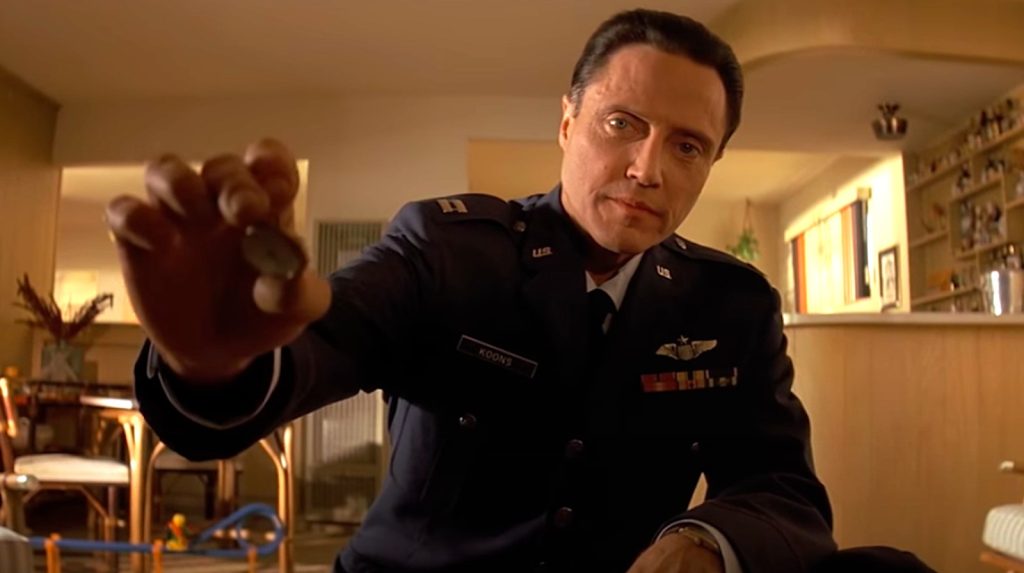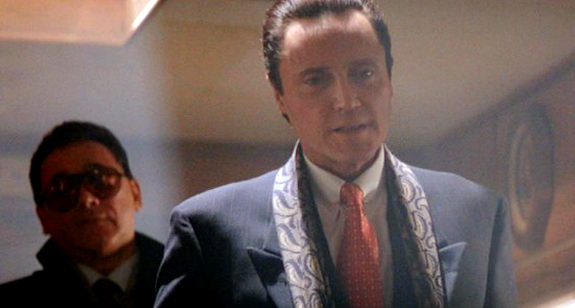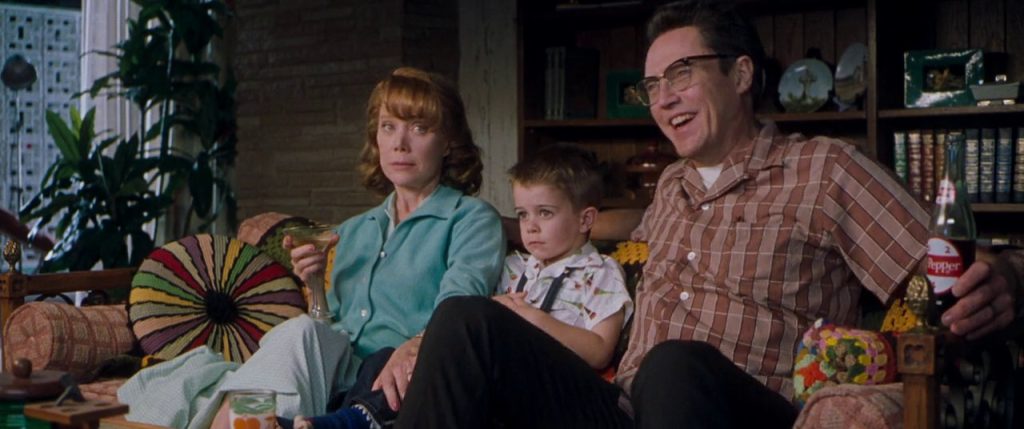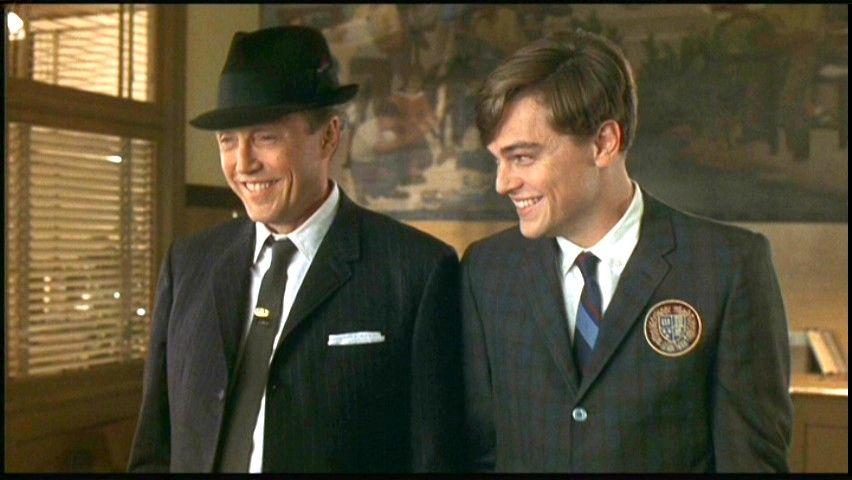
The least conspicuous turd in Batman Returns (1992)
I think I’m on record disliking superhero movies. No, hating them. In Batman Returns I’m supposed to buy into a deformed dwarf crime boss having been raised by penguins in a sewer. Oh, and the dowdy, timid secretary Michelle Pfeiffer is pushed out of a high window onto the pavement and some cats nibble on her and, er… Now she’s Catwoman, a super-confident street fighter in black vinyl. Not dead or disabled or anything, but a whip-cracking wisecracker.
Fucking hell, how do movies like this get made? And why do people go see ’em?
The plot of Batman Returns reminds me of clueless TV presenter Alan Partridge in I’m Alan Partridge being told his BBC show is no more before desperately pitching new ideas to a boss. His on the spot, immediately-rejected ideas include such possible viewing delights as Inner City Sumo, Cooking in Prison and Monkey Tennis. All ridiculous, all dismissed out of hand. And yet in the real world someone pitched an obedient-penguins-in-the-sewer scenario and a big studio spunked up the best part of one hundred mil to make it happen.
Huh?
Anyway, Walken strolls through Batman Returns as a corrupt industrialist. He’s not engaged by his artificial surroundings, looking perplexed most of the time, but at least he’s less ridiculous than his co-stars. Then again, at one point he’s suspended in a cage gawping at a penguin army and I just felt sorry for him. Oh, all right, I did smile when he tried to appease a vengeful Catwoman by promising to buy her a ‘very big ball of string’.
Look, I know I’m incapable of entering into the spirit when it comes to this superhero comic book shit, but Returns strikes me as a flat exercise in shoddy, nonsensical writing, apparently all filmed on a soundstage before an overbearing score was slapped on top. I also get amazed by the analysis such leaden, overlong junk attracts, with idiots wittering on about duality, power and other profundities. Well, for my money, this non-entertaining crap even sells children short. And Christ, it all looks so plastic, wonky and cheap. I doubt the fourth-billed Walken regretted appearing, though, as it turned into the sixth highest-grossing flick of 1992.
Walken re-teamed with director Tim Burton seven years later for Sleepy Hollow to claim his easiest-ever pay cheque. I don’t know what it is about Burton’s underwhelming movies (such as Beetlejuice, Planet of the Apes and Sweeney Todd) but they don’t connect with me, despite their often juicy subject matter. Sleepy Hollow, in which Walken plays a mad mercenary killed during the American Revolutionary War, proves no different. He’s an ace fighter, has a ‘love of carnage’, and sports a gob full of filed teeth that would make any self-respecting vampire envious. He might be dead, but that doesn’t stand in his way of continuing to decapitate the terrified locals. Walken’s screen time amounts to less than a few minutes, a rabid dog cameo that doesn’t even require him to learn a solitary line. I’m not going to say something silly like he’s the best thing in it because there’s nothing wrong with the film’s look or the array of British character actors employed. However, the dull, overlong Sleepy Hollow doesn’t add up to a lot, leaving me fonder of the Headless Horseman terrifying Will Hay in coastal England sixty years earlier in Ask a Policeman.

Memorable cameos in True Romance (1993) and Pulp Fiction (1994)
Like most Tony Scott movies, True Romance is flashy and amusing enough but doesn’t connect. The problem lies with Tarantino’s script which can’t overcome its cliches and implausibilities. There’s a tart with a heart of gold, instantaneous falling in love, a supposedly mild-mannered comics store employee turning into a badass double killer at the drop of a hat, the clunky Elvis stuff, serious bodily assaults having a thirty-second-long impact, and a heavyweight Mafiosi hit man getting done over by a spunky little blonde girl. It’s daft, some of the bit players wildly overact, and I wanted the miscast Christian Slater and the underwhelming Patricia Arquette as a pair of newlyweds to die.
Or at least divorce.
Still, True Romance moves at a fair old lick and boasts one helluva supporting cast.
Walken plays a no-nonsense Sicilian gangster on the trail of some missing coke. His solitary ten-minute scene with Dennis Hopper, the unfortunate dad of our supposedly mild-mannered comics store employee, is the best in the flick. It really is a pleasure to see these two old school faves spark off each other.
Sporting slicked-back hair, Walken is impeccably dressed with a particularly elegant stole. He finishes a cigarette and prepares to get the interrogation underway. Claiming to be the Antichrist, he tells the seated Hopper: “You get me in a vendetta kind of mood. You tell the angels in heaven you never seen evil so singularly personified as you did in the face of the man who killed you.”

It’s a fancy opening few lines and a lot to live up to, but the reptilian Walken manages it. This is partly down to the way he makes his eyes go flat at key moments, an ability that gives the impression he’s emotionally dead. He also does this odd thing where he slowly moves his head from side to side like a reared up cobra getting ready to strike. Hopper can read him just fine â he knows he’s the real deal and there’s no way out â so he chooses a mocking farewell.
“Here’s a fact I don’t know whether you know or not,” he tells Walken. “Sicilians were spawned by niggers.” Walken’s delayed reaction is priceless. There’s no instantaneous rage or witty retort. Instead a half-smile teases his lips. He’s obviously deeply insulted yet can’t help being amused by Hopper’s chutzpah. “Come again…?” is all he can manage before glancing around at his heavily armed henchmen. The deeply offensive theory is duly explained in detail, which eventually provokes laughter and a kiss on the cheek. “You’re part eggplant,” Hopper cheerfully concludes.
Hopper might be sitting down, but it’s clear he’s chosen to die on his feet. Walken does what he has to do and wisely bails before the movie descends into silly OTT gunplay.
In Pulp Fiction, Walken only gets four minutes but still leaves his mark in a flick chock-full of memorable shit. He plays Captain Koons, a former POW on a mission to deliver a prized watch to Butch (Chandler Lindauer), the young son of an air force buddy who didn’t make it back from Nam. Arriving in full uniform at the child’s suburban home, he sits down and calmly explains the watch’s extraordinary history.
First bought by Butch’s great-grandfather in Tennessee on the eve of his WW1 enlistment, it was passed to his son before he was killed by the Japs in the next global conflict. Butch’s father had no better luck. He got shot down over Hanoi and spent five years in a VC-run prison camp obsessively hiding the gold timepiece from his captors.
“The way your dad looked at it,” Capt Koons tells his attentive listener, “this watch was your birthright. He’d be damned if any slopes were gonna put their greasy yellow hands on his boy’s birthright so he hid it. One place he knew he could hide something, his ass. Five long years he wore this watch up his ass…”
Periodically holding up the watch and pausing for dramatic effect, Capt Koons explains to Butch his father succumbed to dysentery, leaving him in charge of the watch. “I hid this uncomfortable hunk of metal up my ass two years… Now, little man, I give the watch to you.”
Walken gives a subdued, deliberately straight performance. It’s still a subtly funny scene, though, partly because he’s telling a profane, racism-tinged story to an angelic-faced child about a supposedly lucky watch that brings nothing but terrible fortune to its owners. Butch, of course, fares no better with the jinxed timepiece, its acquisition failing to stop contact with accidental death, gun-toting gangsters, murder and gang rape.
Tarantino’s influence rapidly spread throughout 90s cinema, resulting in many shoddy imitators of his hyper-aggressive, profane and blackly comic early work. Walken succumbed to this trend by popping up in 1995’s Things to Do in Denver When You’re Dead and starring in 1997’s Suicide Kings. Neither is worth a look.

Some limited laughs: Wayne’s World 2 (1993) & Blast from the Past (1999)
Just like he loves to bust out the dance moves, Walken is also fond of trying his hand at comedy. First off is the lackluster sequel to the big hit, Wayne’s World, in which the overgrown adolescents Wayne and Garth (Mike Myers and Dana Carvey) wear ripped jeans, lust after Aerosmith and indulge in far too many movie parodies. Here Walken snags another undemanding role. The only surprise is that at no point is he seen standing on his head. He plays Bobby Cahn, a suave record producer who wants to bang Wayne’s hot musician girlfriend. Bobby is the polar opposite of Wayne in that he’s mature, loaded and connected. He doesn’t find any of Wayne and Garth’s antics funny, occasionally reduced to staring at them with mild bafflement. I have to say he has my sympathy.
Blast from the Past is one of those flicks that has an engaging (if preposterous) premise and starts chugging along OK before making a fatal mistake. Namely, it thinks Brendan Fraser is a more interesting actor. A shame, as the first forty minutes (in which a kooky, mildly amusing Walken has been raising his son in an underground fallout shelter since 1962) have promise. The decision is then made to send the bland Fraser up to the mightily changed surface. The flick gets lamer with every passing minute as we follow him on a predictable romantic adventure while wondering what Walken is up to.

Making eyes at Oscar again: Catch Me If You Can (2002)
Just over three decades after he made his forgettable debut in The Anderson Tapes, Walken snagged his second Academy Award nomination in Spielberg’s big hit, Catch Me If You Can. Frankly, it’s nowhere near as striking as his first Oscar nod, but at least Catch is a slick, decent watch. A crinkly-eyed Walken plays a con artist whose less than ideal approach to life has rubbed off big time on his teenage son, Leonard DiCaprio. I’d love to tell you about the scenes he steals or the winning lines of dialogue but there aren’t any, leaving me unsure why the Academy took notice. Neither is there any weird stuff or snake-eyed threat.
Then again, perhaps I’m not used to Walken doing subtlety.
Here he’s a quietly broken man who loves his son but is a poor role model. From the moment DiCaprio reveals his yen for dishonesty by impersonating a substitute high school teacher, Walken can’t help but show a sneaking admiration instead of setting him straight. Before long there’s barely a high status profession that DiCaprio isn’t wangling his way into for thrill and material gain. “Ask me to stop,” he half-begs his father. But Walken, his face hidden in silhouette, once again fails to put his foot down. “You can’t stop,” is the simple reply. This is not what DiCaprio needs to hear, but rather an acknowledgment of his boy’s pathological lying and addiction to fantasy.
Walken’s calm, understated performance fits in well with a smoothly functioning cast. His subsequent flicks have coughed up little of note, leaving me with the surprising conclusion that Deer Hunter and Dead Zone are the only classics he’s starred in. Of course, with someone as talented and distinctive as Walken, there’s always the hope he can pull another rabbit out of the hat. He’s so unpredictable, though, that you never know whether you’re gonna get the creme de la creme or a shit sandwich.